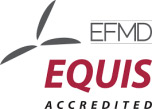Program Curriculum
Core Courses
EDBA601: Research Methodology & Design (Part I)
The Research Methods course is divided in two parts, which will provide participants with a solid foundation and valid frameworks to accomplish their research goals.
The first part of the course examines two methods of approaching research, namely qualitative research and behavioral research. Topics covered include the criteria for valid and reliable research, the advantages and disadvantages of different research strategies, electronic and paper tools for searching literature, research methods - observational, survey, experimental, general writing techniques, writing style, data analysis, and data presentation.
This course introduces students to the field of research. It examines in depth the research process and introduces doctoral candidates to the various aspects of doing scientific research, providing practical advice and insight in the field. Topics covered include hypothesis formulation and theory construction, data collection techniques, ethical issues in research, and research design.
This is a very practical course aimed to guide participants through the work that lies ahead
EDBA602: Research Methodology & Design (Part II)
The second part of the course will examine the fields of quantitative and econometric research. Topics covered include scientific methods, cognitive guidelines, quantification and standardization in survey research, reconciling practical and scientific requirements for creating valid and unbiased surveys.
Part two will examine research tools and applied econometrics, regression analysis, estimation procedures, hypothesis testing, time series modeling, and forecasting.
Additional emphasis will be put on the process of rigorous formation of research questions and research design.
Advanced Courses
EDBA603: Corporate Finance and Governance
Course Synopsis
This module is an analysis of financial structures and the evaluation of the underlying real assets; global strategic planning and controlling; corporate governance structures; legal matters and global tax structures; international corporate policy formulation; international money and banking. Topics further include capital structure, executive compensation, diversification and restructuring, bankruptcy, venture and private equity.
EDBA604: Strategic Leadership
The module is an in–depth analysis of corporate strategies; net–structuring; strategic decision making and alliances building; market niches and organizational capabilities; corporate leadership, knowledge management and diversification strategies; implementation and enforcement of organizational changes within small firms and across corporations. We explore further the processes of creativity and innovation work and their applications.
ISBN-10: 0071441212
ISBN-13: 978-0071441216
EDBA605: International Marketing Management
The course examines the marketing environment from an international perspective, analyzing the cultural, economic, political and legal issues that the contemporary professional faces. Topics include globalization; foreign market assessment, selection and analysis; global product policy; global advertising and promotion; channel management and logistics for global marketing; coordination, selection of representatives and establishing of wholly owned operations.
EDBA606: Managerial Economics
Managerial economics is the application of economic theory to managerial issues. Practitioners – Nestlé executives, McKinsey consultants, Credit Suisse First Boston investment bankers – often rely on economic analysis when they tackle business issues or make important strategic decisions. Elements of managerial economics can be found in all aspects of business activity, such as production, pricing, financing, management and strategy.
EDBA607: Performance Management
This course comprehensively addresses the complex and multidimensional subject of measuring, managing and improving performance through the application of management control systems (MCSs). The discussions assume an advanced level of knowledge of management accounting and practical professional experience. The course presents an all–encompassing framework within which to consider management control issues. It also presents the needed technical subject content and summaries of the relevant research literature. Most importantly, the course supports participants in applying their gained skills to specific decision–making situations. This is done with real world examples and an extensive set of case studies, which reflect the complexity that managers face when using performance measurement frameworks. While standard theories primarily focus on the use and effects of "financial results controls", this course also well describes situations where financial controls are either not effective or are actually counterproductive and discusses alternatives that managers can use in those situations.
Dissertation and Defense
EDBA608: Dissertation
An original, academic written product of the systematic study of a significant problem that follows a coherent methodology, independent research and comprehensive thinking. An appropriate organization and documentation is part of it. A supervisor( typically a local partner faculty member) accompanies and discusses the student's work, closely checks the progress and takes on academic responsibility.
Learning Objectives & Outcomes
At the end of this course the student will be able to:
•to critically analyze in depth a research topic of interest related to the modules of the DBA program in the field of business and/or management;
•demonstrate a profound understanding of the theoretical concepts and frameworks in relevant literature that supports and forms the basis of the main arguments and hypotheses of their thesis;
•demonstrate competency in designing, collecting, analyzing, interpreting and presenting researched data in a systematic manner and to a professional standard;
•demonstrate the ability to approach the thesis arguments from a wider context and to be able to provide unambiguous and convincing evidence to justify and sustain such arguments to its conclusion;
•learn and grow by deepening their self and social awareness in their multiple roles as a business researcher and leader.
EDBA608: Dissertation Defense
Upon completion of the regular course work and dissertation, students are required to pursue the obligatory Dissertation Defense (viva voce). This oral performance review is structured as a hearing vis–à–vis the Academic Defense Committee of HEC Liege Executive Education. The Defense has the purpose to challenge aspects of the candidate's research work, allowing the students to proof their integrity by defending the underlying argumentation.
Learning Objectives & Outcomes
At the end of this course the student will be able to:
•effectively and consistently apply basic and advanced concepts to chosen research areas;
•demonstrate excellent command and understanding of the research literature in the chosen field;
•display the purpose of study / problem statement in a creative and original manner with new and innovative ideas;
•demonstrate excellent and appropriate data interpretation and creatively used the correct methodology;
•identify weaknesses / limitations in methodologies used and the interpretation of researched data;
•discuss all aspects in a superior, accurate and engaging manner;
•justify conclusions and recommendations in an appropriate manner which are clearly based on research objectives and research questions outlined;
•masterfully defend research effort by providing unambiguous and insightful answers to questions;
•provide detailed explanations and justifications that are easily understandable while keeping appropriate eye contact with the audience;
•convince the dissertation defence panel that their thesis is very relevant, has significant impact, authenticity and integrity that will make an important contribution to the chosen field of research.


